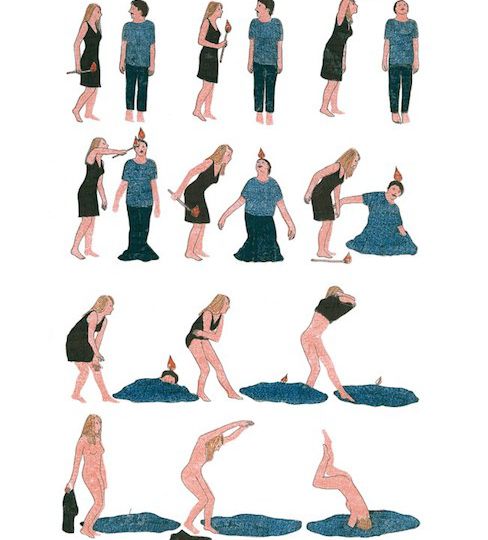
Finally, in a low whisper, he said, “I think I might be a terrible person.” For a split second, I believed him. I thought he was about to confess a crime, maybe a murder. Then I realized that we all think we might be terrible people, but we only reveal this before asking someone to love us. It is a kind of undressing.
– Miranda July, ‘The First Bad Man’
Our February issue this year was on Love and Sexuality, and to conceive of an issue on Relationships and Sexuality that would be distinct from the particularities of the former got us thinking. Is there a relationship at all that cannot be defined by love? And, if we were to begin talking of relationships other than romantic love, how would we speak of sexuality? Upon this deliberation, we realised that our Love and Sexuality issue seemed to revolve around romantic love and sex. The departure this issue on Relationships and Sexuality makes is to try and incorporate forms of relationships that might not be about romantic love but have their own kind of romance, and facets of sexuality that might not be about sex per se but will place its interest in alternate relationships to it.
The Issue in Focus sets the tone, with Radhika Chandiramani questioning the undue pressure we and the world around us create on personal fulfilment through coupledom. What does ‘in a relationship’ mean when in reality we are all ‘in’ so many thriving relationships constantly evolving in various degrees of usefulness and fulfilment in our lives?
Siddharth Narrain carries the idea into the question of legitimacy as he makes a case for the legal recognition of alternative living partnerships. Live-in relationships, living with friends, living in communes, etc are becoming common in urban India, and it’s about time the legal system caught up with accommodating these specificities.
Shikha Aleya seeks to look at family history through a different lens: that of sexuality. How would our genealogies read if we were to study the lives of our ancestors as being influenced by aspects of sexuality? In her turn, Surbhi Dewan undertakes a philosophical musing as she recalls her mother telling the little her about moh (Punjabi word meaning love of and attachment to worldly things) and moksha (in Hindu philosophy, moksha refers to the emancipation or release from the cycle of rebirth). Ajay Maherchandani uses the metaphor of the cage to describe the life of a gay man in his heartfelt piece on freedom from societal shackles.
Gayatri Mohan calls out the adult figures of authority in her life for insulting her intelligence and agency in their sexist expectations of youngsters, and has a thing or two to say to her peers as well. Dr Mahinder Watsa, possibly India’s most famous sexologist, is his wry and pithy self in his quickie interview with us on relationships and sexuality.
Giving ‘relationship’ an interesting spin are Kristin Francoeur and Surabhi Srivastava as they investigate how men in different countries across the world relate to abortion, and how it affects their relationships with their partners.
In the Visual Corner, Brushstrokes features Married Young, a series of photographs by Muyi Xiao that portrays very young Chinese couples married for various social and economic reasons. In the Video Page is Find Your Beautiful, a rousing appeal to be kinder and more accepting in one’s relationship with oneself, starring Radhika Apte.
The Hindi section has a stirring poem by Asmi on ‘coming out’, republished from our January 2014 issue, and a translation of Shivani Gupta’s piece on ‘odd’ couples that was published in English in our May 2015 issue.
The Corners this month are both personal narrations of contemporary conundrums around relationships and sexuality: one is a feel-good love story (with a twist) of a small-city girl voiced in a refreshingly local tongue, and the other is a set of illustrated tales of Indian Tinder matches.
For the mid-month issue, we have four Voices pieces: one by Namrata Chatterjee, where she expresses her opinions around issues of relationships and sexuality as a young person, one by Sig from the Kinky Collective where he talks about finding friendship in the kink community, one by Moulshri that revolves around her interviews with people talking about how ‘romantic love’ can or cannot be found in the context of feminism and two poems by Nilesh.
The issue also features one of our older articles republished in the Hindi section.
In this month’s Blogroll, we have Why I Am Addicted to Friendship Affairs, And Why it Has Nothing to Do With My Marriage, and also one of our older articles, republished.
We return in June with two fortnightly issues on Work and Sexuality.
Until then, happy reading!
The TARSHI Team
Image from In Pieces by Marion Fayolle